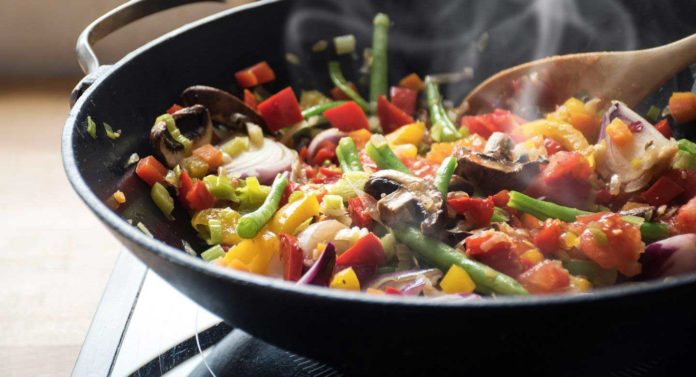For the first time, scientists have shown that cooking food fundamentally alters the microbiomes of both mice and humans. The findings are expected to boost the understanding of how cooking may have changed the evolution of our microbiomes during human prehistory.
Study senior author Peter Turnbaugh, Ph.D., an associate professor of microbiology and immunology said, “Our lab and others have studied how different kinds of diet – such as vegetarian versus meat-based diets – impact the microbiome. We were surprised to discover that no one had studied the fundamental question of how cooking itself alters the composition of the microbial ecosystems in our guts.”
Scientists analyzed the effect of cooking on the microbiomes of mice by feeding diets of raw meat, cooked meat, fresh sweet potatoes, or cooked sweet potatoes to groups of animals — selected because prior data demonstrated that cooking alters the nutrients and other bioactive mixes in both meat and tubers.
Scientists were surprised to know that raw versus cooked meat had no detectable impact on the animals’ gut microbes. Interestingly, raw and cooked sweet potatoes altogether changed the composition of the animals’ microbiomes, just as microbes’ patterns of gene activity and the biologically critical metabolic items they delivered.
The specialists affirmed their findings are utilizing an increasingly different array of vegetables, performing what Turnbaugh called a “mad scientists experiment” – sustaining the mice an assortment of raw and cooked sweet potato, white potato, corn, peas, carrots, and beets.
The group attributed the microbial changes they saw to two key factors: cooked food allows the host to soak up more calories in the small intestine, leaving less for hungry microbes further down the gut; on the other hand, many raw foods contain potent antimicrobial compounds that appear to damage certain bacteria directly.
Turnbaugh said, “We were surprised to see that the differences were not only due to changing carbohydrate metabolism but also may be driven by the chemicals found in plants. To me, this highlights the importance of considering the other components of our diet and how they impact gut bacteria.”
Scientists performed a detailed analysis of the chemical changes that cooking produced in each plant they had fed to their mice, resulting in a shortlist of compounds that might explain how these diets may have impacted the animals’ microbiomes, a question they are currently analyzing further.
Scientists noted that raw diets caused mice to lose weight, and they wondered whether this resulted from the changes to their microbes. But when the team transplanted these altered microbiomes into mice living on a regular diet of mouse chow, usually fed animals instead put on extra fat, a seemingly paradoxical finding the scientists are still investigating.
Turnbaugh said, “Understanding how diet impacts the microbiome has important implications for how our gut microbes influence weight gain and other aspects of human health. The study also raises intriguing questions about how human-associated microbes have evolved over the millennia to adapt to our culinary culture, and whether this could have important side effects for modern health.”
The study is published in the journal Nature Microbiology.
